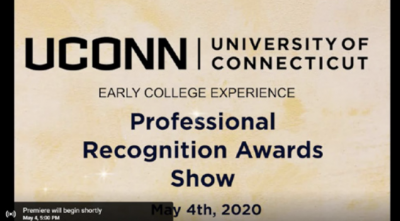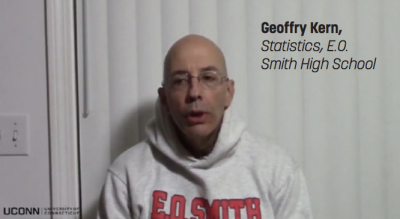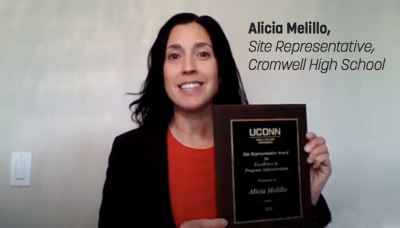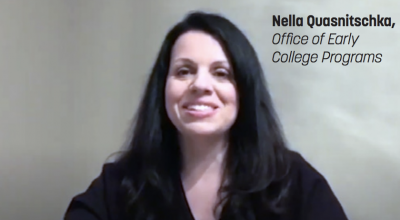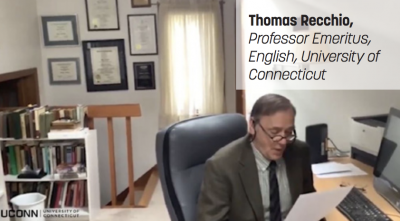By Kathrine Grant
It goes nearly without saying that the past few months have changed lives fundamentally and profoundly. Schools and offices are closed, graduations are cancelled or postponed, and our daily lives have been disrupted in ways that will radically change our future. The ramifications of COVID-19 are unlike anything anyone has seen before. Yet, in like, the strength of our Students, Instructors, Site Representatives, Library Media Specialists, Faculty Coordinators, and the entirety of the UConn ECE Community has been unmatched.
These are trying times. Students and Instructors have shifted to online learning, both synchronous and asynchronous, in the matter of days; Faculty Coordinators gone through the same transition in their courses and shared resources with the Instructors they support. Parents, families, and school communities have gathered around their students to support them as they transition to online learning, make decisions about post-secondary plans, and grieve the many losses that have come as a result of this pandemic.
We wanted to highlight the strength, ingenuity, and resilience of our community that has shown through in these uncertain and challenging times. As we have seen in our community and beyond, profound challenge requires creativity, adaptation, and compassion: it is in our greatest challenges that we come to know the true depths of our strength, resilience, and courage. Our community has shown time and time again, together we are UConn ECE strong.
Note: Interviews have been edited for clarity.
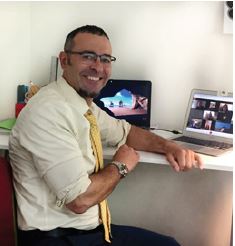 Juan Jose Vazquez-Caballero, UConn ECE Instructor: Lyme-Old Lyme High School (SPAN 3179)
Juan Jose Vazquez-Caballero, UConn ECE Instructor: Lyme-Old Lyme High School (SPAN 3179)
Mr. Vazquez-Caballero grounded his transition to distance learning through using the goals of his original, in-person curriculum to inform online learning and create an analogous digital environment through the effective use of technology. Three days a week, Vazquez-Caballero hosts synchronous learning with students, where they converse in Spanish to check in about their learning and upcoming work. He found the greatest challenge to be supporting students as they continue to develop listening and speaking skills in a digital space; he has begun using Screencastify to create mini-lessons with questions and pause points for students to answer as they would in the classroom.
The biggest success that Mr. Vazquez-Caballero has seen with the transition to distance learning is how his school “gathered feedback from families and spent a lot of time discussing how to best adapt to the circumstances and support our students and their families. We have given a lot of thought to make the curriculum flexible, engaging, and meaningful, and we have set up a structure to focus on continual improvement.”
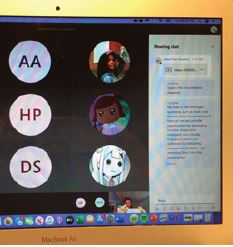 Ann Trapasso, UConn ECE Instructor: Central High School (ENGL 1010)
Ann Trapasso, UConn ECE Instructor: Central High School (ENGL 1010)
During the transition to distance learning, Ms. Trapasso shifted her ENGL 1010 course to task students with coming to terms with the pandemic, where “they would notice what most interested them about the pandemic and collect materials that, when curated, would develop into a multimodal project.” She shared that “the need for each student to ‘make sense’ of the pandemic was very real and immediate,” and so she recalibrated her class to be a space where students could document, process, and understand their own experiences. Providing students with this creative outlet allowed students to develop projects that were intimately tied to their experiences; one student, whose mother is a nurse, is creating an infographic “that clarifies how much these nurses are contributing and the conditions under which they must work, including those who are the least skilled and must work at more than one facility in order to earn a living.” The strength and humanity of this project is twofold: it has provided some students a lifeline to document and process their experiences and the opportunity to create something that “allows them to send a message out—where it might be heard and might do some good.”
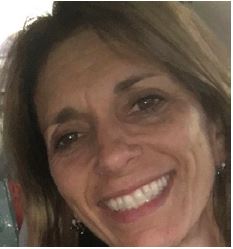 Tina Riccio, UConn ECE Instructor: Southington High School (SPAN 3178, SPAN 3179)
Tina Riccio, UConn ECE Instructor: Southington High School (SPAN 3178, SPAN 3179)
Ms. Riccio is using a blend of synchronous and asynchronous learning in her transition to distance learning: she hosts small groups with students in seminar formats and uses the “room” feature in their video conferencing platform for students to take part in group discussion. Her students were eager to participate in the live breakout sessions and shared how much they missed school and were excited to see one another. She grounded their smooth transition partly in the strong relationships that were already established with SHS students.
Ms. Riccio’s school took on the adaption to technology through collaborating with their district technology director who trained teachers. Her department then taught themselves many different educational technologies and created tutorials to share with one another; they hosted Q&A sessions for department members to troubleshoot any issues or problems. The use of technology also allows all live sessions to be recorded and then posted for any student who may have to miss class so that teaching and learning are more responsive the lives of students under current circumstances. The collaboration between professionals allowed her department to “keep the integrity of their curriculum and teach the big ideas” so that their essential questions and enduring understandings have not changed. She shared that “we have made the best of a difficult situation, but teaching and learning were not meant to occur in this format.”
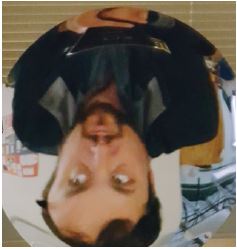 Joshua Welch, UConn ECE Instructor: The Woodstock Academy (PHYS 1402Q)
Joshua Welch, UConn ECE Instructor: The Woodstock Academy (PHYS 1402Q)
Mr. Welch has found that the transition to distance learning “has presented some challenges but nothing that some creativity and flexibility can’t address.” This perspective has propelled him to incorporate a variety of lesson structures across his classes to allow students the same laboratory experience with his Physics courses—but all classes begin with a wellbeing check in with students. This has allowed him to continue to build a classroom community even as they are physically apart. As he shared:
“We just need to listen to the kids, keep an open line of communication, and move with them. Spending a moment to just talk every day and really consider their feedback is important. Being able to evaluate our teaching, and being willing to start all over if needed, requires a lot of effort, but we owe it to these kids who are missing out on so much right now.”
The transition to distance learning has been a challenge for all, but Mr. Young finds his inspiration in the motivation and resiliency of his students.
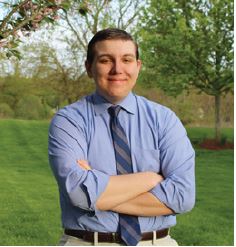 Christian Chlebowski, UConn ECE Student: Somers High School (ENGL 1011)
Christian Chlebowski, UConn ECE Student: Somers High School (ENGL 1011)
It is important to remember, in this time of uncertainty that everyone is struggling to deal with their emotions. Reaching out to anyone and everyone can not only help you, but help them, too.
“‘Congratulations again, Class of 2020. I wish you the best of luck in college, the military, or wherever your life path takes you!’” That phrase is one I had been rehearsing in my head for months – the traditional farewell the senior class president confers upon his or her peers during their class address at graduation. But this year, no one knows if I will ever get to say it.’
Senior year is supposed to be the pinnacle of high school achievement; after the stress of eleven long years of academic and social pursuits, one’s final year in high school is a celebration. While the fall semester is difficult, especially due to college applications, the spring semester at my high school includes prom, the senior outing to Boston, the senior banquet, senior awards, and, the ultimate achievement: walking at graduation.
For the Class of 2020, none of those might happen.
Adjusting to that reality, and the unknown that accompanies it, has been the greatest challenge of my academic career. And while myself and my fellow class officers are working closely with school administration about how to handle this and how to make the conclusion to our senior year meaningful, barrier after barrier seems to have been erected. It’s tough to plan for something that might never happen. It’s tough to work with peers who are as emotionally distraught as you are. It’s tough to deal with the unknown.
Unknowns permeate throughout life, and how we deal with them often shapes our futures. But nothing – no challenge I can foresee – will ever surmount this one. The world is at a standstill; it would be nice to be wearing a cap and gown, marching through that standstill and up to receive my diploma, but that is cast in doubt.
It seems that, out of four graduations I have played (or will play) a role in (either by playing in the band, conducting the band, or marshaling for the senior class), this will be the defining one, and the most challenging one to boot. No academic or social pursuit can surpass that.
Perhaps, instead of the traditional class president remark, I will have to adapt it.
‘Congratulations again, Class of 2020. Although we cannot be together celebrating right now, we have survived what may well be the greatest challenge of our lives – surviving a global pandemic. No matter what you do in college, the military, or wherever your life path takes you, remember that you survived this challenge, just as you can survive any other challenge you face.’”
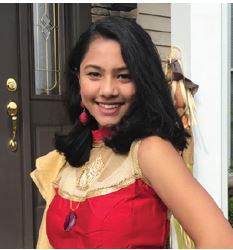 Anindita Chakravarty, UConn ECE Student: South Windsor High School (HIST 1400)
Anindita Chakravarty, UConn ECE Student: South Windsor High School (HIST 1400)
I now understand how important it is for people to work and come together during times of crisis such as the COVID-19, and how it is time to change not only what we think about ourselves but the world around us.
When distance learning all started, the transition from a normal school day to distance learning was overwhelming and tough. The students, as well as the teachers, were confused about how the material was going to be presented. During the first week of distance learning, I had to figure out a plan of how to finish up all my schoolwork and be able to study for exams, as there was material constantly being posted every day on google classroom. The biggest help through the whole transition process were the teachers. Their compassion and understanding during this difficult time are what really helped the transition process go smoothly. Many teachers were very lenient when work was handed in and were more than happy to give extra credit and help students out in any way possible. Since then, distance learning has been a very positive experience in my life.
Many people around me are constantly dealing with consequences due to this virus, one of the main issues being people's jobs. It is lucky that many people still have them and are able to work and provide for their families. What worries me is the families that are having a difficult time providing for themselves, either because they don't have a job or due to many necessities being limited around us. This thought really boosts the emotional empathy and motivation I feel, and the willingness to help other people. This idea of coming together was shown to me just a couple of days ago when my community came together to drive their cars around different neighborhoods alongside firetrucks and policemen to show our support and appreciation to the first responders. Each person holding out a "Thank you" sign from their car to everyone around the community. This just showed me the strength and power we all have within us when we come together. Just seeing smiles on all the first responder's faces as we passed them was enough to show them that there are people who care and are rooting for them.
 Esther Deutsch, UConn ECE Student: Bais Yaakov of Waterbury (AH 4092, ENGL 1010)
Esther Deutsch, UConn ECE Student: Bais Yaakov of Waterbury (AH 4092, ENGL 1010)
Yes, we are covering less, and things have changed. But we haven’t lost the beautiful atmosphere that makes our school what it is. The love, care, happiness, determination, and laughter that keeps our school running will always be with us, no matter what.
The coronavirus. COVID-19. Pandemic. Quarantine. Social distancing. Stuck at home for weeks. Stores closed. School canceled. One tiny, miniscule virus has brought the world to its knees. What the virus has done to the world is beyond belief. It’s unimaginable. And we are just trying to figure it out. We are confused. How could this happen? And the hardest question of all… now what?
Being stuck at home is definitely tough. But what's tougher is the thousands of people fighting for their lives. I think of children that have lost grandparents, adults losing their parents, and the elderly, who have lost their husbands and wives. I think of the doctors and nurses, risking their lives, working endless hours to take care of our nation. I see the bigger picture, and I pray for them every day.
But then, there’s me. The smaller picture. Me in my daily life. Without school, without my teachers. Without my friends, without shopping. And while I’m aware of the bigger picture, I know that there’s something I can take out from this. There's a message for me. And suddenly, I look around, and I know. I know exactly what coronavirus is here to teach me. I start to appreciate life. Appreciate the normal. Embrace the regular. When have I ever been grateful for merely getting in the car, going to the store, meeting people, and driving home? Just visiting my neighbors. Hanging out with my friends. Attending family obligations. Celebrating weddings. Going to school. Connecting with my teachers, my friends. Never. Never have I once thought, wow, it's so beautiful that we are all able to be here together. I just take it for granted. That’s what happens because it’s normal. Usual. Expected. But what gives us the right to expect everything to go right for us?
Coronavirus has made me a grateful person. It has changed me. I have realized that I can lose so much in just seconds that I need to hold on to everything I have. Appreciate it. Seize my opportunities. It’s hard to learn through a screen. It’s hard to not see my teachers and friends every day. We all know distance learning is not ideal. This is reality now. So what can I do?
I can be thankful that for the past ten years of my schooling, I got to go to school every day. See my teachers and friends. And even though it’s different now, I can learn to be grateful in other ways. I am healthy right now. I have enough food. I am home, safe with my family. When we just change our perspective, the ugliest, most horrible circumstances become beautiful gifts bestowed upon us.
 Emma Browning, UConn ECE Student: Norwich Free Academy (CHEM 1127Q/1128Q, HIST 1501/1502)
Emma Browning, UConn ECE Student: Norwich Free Academy (CHEM 1127Q/1128Q, HIST 1501/1502)
Now, I have the leisure to do my assignments when and where I want. Although some tests are online and have a set time, they rarely occur before 11 a.m., and my mind is fresh when I take them.
Admittedly, a lot of the distance learning process has been unprecedented. As a member of the class of 2021 undergoing the early phases of the college application process, I've seen countless schools cancel their testing requirements-even Ivies like Cornell or Columbia. Drastic changes in AP testing has also impacted my two AP classes this year and our current course load. For my UConn ECE courses, I have noticed two things: the flexibility of my teachers in continuing our education, and their utter dedication to us and our learning. Neither of these are surprises, per se, but they have been highlighted by the recent epidemic.
Regarding flexibility, my ECE U.S. History class has substituted multiple choice for graded essays that demonstrate our knowledge, interactive presentations, and voiceovers of the class notes to bolster our understanding. In UConn Chemistry, my teacher, who had almost no experience using screen recording techniques, taught herself overnight and asked for our input on what learning strategies worked.
Regarding dedication, both of my ECE teachers have done their best to make sure we walk away with the knowledge (and credit) of a UConn class, but also the utmost care and concern. My U.S. History teacher, Mr. Howard, would often discuss current events with us in class and joke around with us at times, and set up a Google Meet to check in on us and talk about the changes that occurred in light of distance learning. He also uploaded all of our unit materials to Classroom so that we could start studying and reviewing them at our own pace. My Chemistry teacher, Mrs. Trotochaud, has truly gone above and beyond. In light of these circumstances, she has done her best to make sure we receive course credit following the exacting UConn standards, and has made her expectations clear for the class-all the while doing her best to help us adjust. Simultaneously, she runs several Google Meet help sessions a week, regularly quizzes us, sends supplemental materials to aid our learning, and makes numerous explanatory screen recordings. The night before a major test, she sent me a thoughtful email checking in on me and asking if I had any questions since I usually check in with her a week before a test, and sent me an individual screen recording explaining a problem late at night.
Many of the academic changes have been unprecedented, but the UConn ECE teachers have truly, if not entirely surprisingly, stepped up to the task.
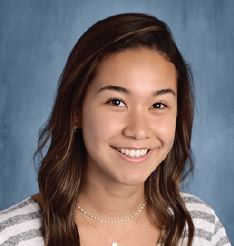 Lina Singh, UConn ECE Student: Staples High School (ILCS 3239, ILCS 3240)
Lina Singh, UConn ECE Student: Staples High School (ILCS 3239, ILCS 3240)
The most surprising thing that has happened to me with distance learning was that I've actually learned new things about myself and my goals by having more downtime in my day.
Before quarantine, my brain was constantly preoccupied with school for the majority of the day. But now, I've had the time to be able to tap into my interests, research possible majors and colleges, improve my writing skills, and spend quality time with my family. These are all things I never realized I missed during the school year, especially junior year, but with distance learning, I feel like my life has more balance to it and I've surprisingly grown as a person and knowing who I am and what I want to be.
While living in quarantine and hearing about the turmoil due to COVID-19 has been distressing, I’ve taken some time to think about what’s truly important in life, and that’s the notion of living in the present. As cliche` as it may sound, this mantra has never been so apparent. I put my own spin on the saying: “make time for memories”. Prior to quarantine, I was constantly worrying about the next test, homework assignment, researching colleges, and everything else in a junior’s agenda. But this extraterrestrial-like pause in time has forced me to live in the moment. I finally have the time to do the things I’ve always said I would but never had time for. I’ve opened my eyes wider to the world around me. Every day, I’m either cooking meals, talking with friends and family, or refurbishing old clothes. While the current conditions of our world are truly unfortunate, I know we will bounce back stronger than before. I know that when things return to normal for me, I will definitely be making more of an effort to halt the brakes of everyday life once in a while, wave to a stranger, and ultimately, “make time for memories.”
Spring 2020
The Last Great Frontier in Concurrent Enrollment
By Brian A. Boecherer
For the last twelve years UConn Early College Experience (UConn ECE) has been pushing at the border of the last great frontier of concurrent enrollment – research. Not just best practices, but the production of theory and knowledge on concurrent enrollment. How does this innovative and sustainable model of education support student and instructor success? How does concurrent enrollment support student retention in higher education? How do we affect teaching and learning in low-income, urban, and rural areas? The questions are endless.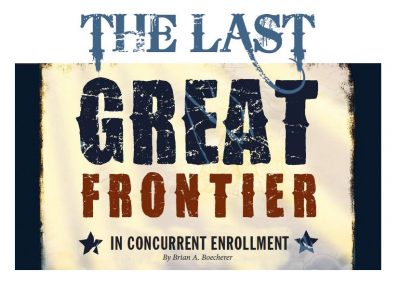
Concurrent enrollment has come of age; it is offered in every state and is even starting to move outside the United States. It is time to move the national agenda forward again. To this end, UConn ECE, Syracuse University, and Boise State University are collaborating to create a peer-reviewed journal on concurrent enrollment entitled the Concurrent Enrollment Review (CER). This first peer-reviewed academic journal on concurrent enrollment, which is three years in the making, will offer educational professionals, researchers, and policymakers insights into this interdisciplinary model of education.
Preceding the CER is a UConn legacy of research in this area. UConn ECE’s research agenda was first started in 2006 by Brian Boecherer, one year after he was hired as assistant director. At that time the office had mountains of data that it previously never had the capacity to comb through and analyze. It took two years to construct accurate student enrollment records, credit counts, and read through the archives from 1955, when the program was established. During that period Brian traveled to every partner high school, along with many new schools, every academic year and had learned what the high schools needed to better support the program. By 2008 he became the first Director of Research and Development for the office.
Armed with historic data and qualitative assessments from countless site visits and student course evaluations, an ambitious agenda was set. Brian became an active presenter on the national scene with over 25 research presentations at national conferences and a smattering of keynote addresses. He published in the first university press publication on concurrent enrollment (Syracuse University, 2016), and won a grant with his colleague Magdalena Narozniak to study concurrent enrollment transfer credit. This publication specifically focused on how credits earned through UConn ECE transfer to other universities. It is still the largest study on the topic to date and resulted in the program’s nationally recognized Credit Transfer Database.
In January 2018 Carissa Rutkauskas joined the office to take the program’s data to the next level by translating program research into something more digestible to the public. Carissa’s contributions to the research team has dramatically increased the high schools’ ability to access data, understand it, and present it to their communities. Carissa brought the Credit Transfer Database into the 21st Century along with important high school materials and data portals for the high schools. Carissa has become an active researcher in this area – in addition to overhauling of the program’s student course evaluations and the alumni one-year and four-year follow-up surveys, she is writing an article with colleague Kathrine Grant on the history and origins of concurrent enrollment.
Over the last four years, UConn crossed the border into this last great frontier to instill more intentional ways. First, UConn ECE sponsored a research grant competition for UConn professors interested in concurrent enrollment that would lead to research, national presentations, and peer-reviewed publications. Associate Professor Scott Campbell (English) and Assistant Professor Michele Back (Education) both won grants to advance their research in this area. Dr. Campbell and many of his UConn ECE instructors were accepted to present their research at the 2019 National Council of Teachers of English Annual Convention on the central role of concurrent enrollment in first-year composition. Dr. Back produced a white paper with her colleague Joseph Dean on how concurrent enrollment effectively increases the recruitment and retention of high school instructors in critical need subject areas. They are planning on developing their research into a future peer-reviewed publication.
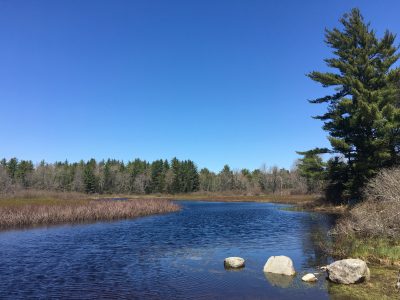
Since 2017 Brian has been presenting with colleagues from Syracuse University and Boise State University on the need to develop an academic journal that would attract researchers from all disciplines with an interest in concurrent enrollment. After two successful national presentations, we are moving forward with the Concurrent Enrollment Review. The call for paper will be announced at the NACEP conference in St. Louis. Missouri in Fall 2020. Brian Boecherer was named the Editor-and-Chief and Syracuse’s Dr. Melanie Nappa-Carroll (Assistant Director, Syracuse University Project Advance) was named the managing editor. Dr. Scott Warren, Associate Dean for Research Excellence at Syracuse University, has heralded the CER as a necessary publication in this emerging academic field. His endorsement comes with the full support of the Syracuse Library.
The CER has two distinct parts. First, the CER will serve as a research bibliography, a clearing house, that collects the articles and abstracts of all previously published peer-reviewed articles and dissertations on concurrent enrollment. The CER has already hired a library scientist to start cataloging articles. After the initial cataloging, the Syracuse Library Artificial Intelligence (AI) system will scan all published peer-reviewed journal articles to further develop the CER bibliography clearing house. This clearinghouse will support researchers like Scott, Michele, Carissa, and so many others to develop their literature reviews and new veins of research. The second part of the CER is the journal itself, which will publish new peer-reviewed articles on concurrent enrollment. As the field is diverse, the journal’s editorial board will also be diverse and support the promotion and tenure of all professionals in this space. The founding board members have also decided to make the journal open-source, so information is available to all, regardless of location and background.
UConn ECE sees this as the next step in its legacy of leadership and innovation. UConn ECE was not only the first university to start offering concurrent enrollment in the nation; in 2000, UConn ECE was a founding member of the National Association of Concurrent Enrollment Partnerships (NACEP). Following, UConn ECE helped create the New England Association of Concurrent Enrollment Partnerships. The CER is the next step in the program’s legacy of leadership and innovation and does the program proud to also be a founding member of the first academic journal on concurrent enrollment.
UConn ECE News Brief
By Brian A. Boecherer
Remote Learning
On March 12th Governor Ned Lamont announced the closing of all schools in Connecticut until March 16th. He later extended closures to April 30th and eventually for the entire school year.
UConn ECE sent a survey to all 208 partner schools to understand how high schools pivoted to remote learning. By the first week of April, all schools were teaching online.
From the survey, 70% of partner schools are using a Google platform/Google tools to engage with students, while 21% of partner high schools are also using Zoom while also using Google tools.
At the time of the survey the most prominent concerns from the high schools were: managing labs, managing exams, and finding additional creative resources to keep classes going.
Grading
The UConn ECE Withdraw/Audit deadline was extended to the end of the academic year, allowing students to submit the Withdrawal Form at the end of their class. This decision parallels the University’s Pass/Fail policy.
Pass/Fail was introduced to the UConn ECE community from an email from the Provost to all teaching faculty. Pass/Fail has never been an option for UConn ECE students, and after much deliberation, it was not extended to UConn ECE students during our current crisis.
UConn ECE worked with the Connecticut Department of Education and the Connecticut Association of School Superintendents to introduce
the option of a Pass/Fail fourth quarter at the high schools to make allowances for the pivot to remote learning.
Final exam policies were made clear to UConn ECE Instructors by the beginning of May. While finals continued, individualized plans were created for schools as necessary.
Resilience

The UConn ECE Community pulled together during this unprecedented time to find solutions to issues. UConn ECE departmental listservs were well-utilized to make announcements, share best practices, and support each other in real ways.
High schools continued nurturing their communities as well. One stellar example, Wethersfield High School, engages with their students by offering a weekly morning announcements, highlighting life, teaching, and learning at a distance.
UConn ECE created a digital Professional Recognition Awards Show to replace their annual Professional Recognition Award Ceremony. It was live broadcast on May 4th through YouTube Premiere.
Registration
Registration for 2020-2021 opened on April 30th. Students have the next two months to apply to the program. This year, due to an
inability to access printers, high school signatures are not required.
Students will enroll in courses from August 11th to September 30th. Students who did not apply in the spring can apply in the fall without a late fee.
Summer Plans
Pre-College Summer was forced to cancel their summer plans of hosting 500 students for their residential program. The PCS team will use this time to retool and implement strategic planning for the coming years.
 UConn ECE New Instructor Orientation, which is usually in June, was postponed to August 21st. This orientation will be hosted through HuskyCT and will utilize an online format. It will be a combination of live and asynchronous video. More details are to come.
UConn ECE New Instructor Orientation, which is usually in June, was postponed to August 21st. This orientation will be hosted through HuskyCT and will utilize an online format. It will be a combination of live and asynchronous video. More details are to come.
Similarly, UConn ECE is making arrangements for moving all professional development workshops online for the Fall semester in preparations for the possibility that we will not be able to meet in person.
NACEP has put a pause on accreditation applications for 2020. UConn ECE was prepared to submit its application on July 1st however due to COVID, the organization has decided to put a hold on applications for a year. UConn ECE is a founding member of NACEP and was first accredited in 2007. Since our first accreditation, UConn ECE has quadrupled in terms of courses offered to the high schools and has quintupled in terms of student enrollment.
Rutkauskas and Grant Presentation Accepted at NEACEP Conference
By Carissa Rutkauskas and Kathrine Grant
The 2020 New England Association of Concurrent Enrollment Partnerships (NEACEP) was to be held at the University of Rhode Island on May 29, with the theme of Barriers & Breakthroughs in Early College Programming; however the event was postponed due to COVID-19. Carissa Rutkauskas and Kathrine Grant’s presentation, CE in NE: History, Facts, and Stats to Communicate a Stronger, More Unified Future will have to wait until it is safe for people to once again travel, gather in groups, and appreciate the freedoms associated with a pre-pandemic lifestyle. While we will not be presenting at NEACEP this spring, we would like to share a glimpse of what we have been working on here.
The presentation is an overview of the challenges and barriers created by a lack of centralized, key programmatic features across the field and within specific programs—including marketing, data, and theory behind Concurrent Enrollment (CE)—and offers suggestions of for a centralized ideological strategy, organizing, professionalization, and strategic marketing as part of the solution.
Centralized ideological strategy. CE programs vary vastly by region, state, and even within states. A sample of differentiating variables include, but are not limited to: program name and terminology used, who teaches, where courses are taught, cost of program, matriculation status of the students, and programs hosted by two-year technical versus four-year institutions of higher education (IHE). The University of Connecticut’s original concurrent enrollment program, the High School Co-operative Program for Superior Students, was established in 1955 and laid the groundwork for its continuously operating program. In 1997, the National Association of Concurrent Enrollment Programs (NACEP) became the first, and to date, the only national accreditation body of its type. They, and organizations such as the College in High School Alliance, the Education Commission of the States, and independent researchers, have helped create a strong framework and standards for the idea of high school students taking college courses.
Essential to this agenda is an agreed upon, standard terminology. The U.S. Department of Education defines dual enrollment (DE) as students enroll in postsecondary coursework while also enrolled in high school.* NACEP defines CE as the subset of dual enrollment courses taught by college-approved high schools. Yet, not all programs or states employ the same language to describe the same process of accelerating secondary learning: a concurrent program in one state may be considered a dual enrollment in another. These seemingly straightforward definitions, unfortunately, have not established a precedent on name standardization at the state-level; the issue of naming and terminology is and are further exasperated with the use of dual credit and names and definitions unique to states and individual programs.
Equally essential is determining what CE is not. Standardized tests, such as the College Level Exam Placement (CLEP), Advanced Placement (AP), and International Baccalaureate (IB) can be categorized as Prior Learning Assessments (PLAs), where credit is earned outside the classroom, or based off a single assessment, usually in the form of an exam. These and other PLAs are often mistakenly categorized with CE credit, for political, economic, or reasons of unfamiliarity with the differences. Clearly defining and communicating what CE is, including the parameters of instruction, location, and testing, is paramount to its continued success.
Organizing. NACEP, NEACEP (and other state NACEP chapters) have done amazing work in creating a more centralized and unified approach, but states without a strong statewide CE policy or legislation are often left fragmented. In Connecticut, for example, the brief amount of the State legislation on CE is vague at best and does not assign a name to high school students enrolled in college courses (regardless of where they are taking their course—at their high school or on their a college campus). Even as the home of the first concurrent enrollment program in the country, our State guidance is not well-defined, diminishes the strength of CE programs.
Of the 36 degree-granting undergraduate IHEs in the State, nearly all offer some type of college credit program or opportunity for high school students – whether it be CE, DE, PLAs, or another model. Unfortunately there is currently no accurate database or combination of internet search terms that would produce a complete list of these courses. To find all of the programs in Connecticut, you would have to combine a series of search terms—and you still might miss a program or two. States such as Utah and Vermont have comprehensive statewide policies in place and assign a specific and clear name to their programs. The lack of common language between and among states not only further obscures the prospect of comprehensive research or the likelihood students being able to maximize earning college credit while in high school—it also provides utter confusion. For example, Utah uses the term concurrent enrollment and Vermont’s choice is dual enrollment in state policy for programs in which a secondary school student can take a postsecondary course at the high school or IHE with IHE oversight. At UConn ECE, we would define this as a concurrent enrollment program—even though our program is only for students who take postsecondary courses at their high school.
The National Center for Education Statistics (NCES) also does not completely accurately represent these type of programs. Although UConn ECE is the oldest and one of the largest programs in the country of its type, its CE impact is often overlooked. UConn ECE students are not matriculating college students, but rather non-degree students. This means they have the option of transferring their credits to a degree-seeking instruction (non-matriculated means that just because they are a part of UConn ECE and are taking UConn courses, they are not pursuing a degree at the University). UConn ECE is one of the nation’s largest programs, serving approximately 13,500 students annually, but these figures are often captured only at the institutional level and are missing from NCES databases or at the state level. Without organizing, and the consistency in language that comes with, the impact of programs like UConn ECE—from providing access to higher education to the many financial benefits for students—can be completely overlooked.
Professionalization. The sharing and dissemination of specialized knowledge and information in relation to CE programs through professional organizations not only safeguards and refines best practices but provides an opportunity for mutual enrichment and advancement. Organizations like NACEP and NEACEP do just this: from conferences to reaccreditation, they help to ensure quality in programs and continual improvement within the field. These organizations not only help maintain a sense of norms and offer a centralized ideological strategy through their research, advocacy, engagement, and community and comradery through networking and volunteering—they also often are involved in accreditation based on a shared set of standards.
Also key to communicating and challenging new studies, theories, and practices is a peer reviewed academic journal. The CE discipline is fortunate to have a small, but growing, number of organizations and researchers sharing this common purpose; but, the volume and support of research in CE is much less established from than other areas. Those involved with community colleges, for example, can be a member of the American Association of Community Colleges, as well as dozens of niche councils, alliances, and associations, with focus on topics such a specific demographic or geography. Institutional accreditation, at least in California, is conducted at the Accrediting Commission for Community and Junior Colleges (ACCJC), while institutions in the rest of the county fall under the auspices of regional accreditations who also serve 4-year institutions. Research is collected in publications that are independent and unbiased from the accreditor in peer-reviewed journals such as Community College Review and Community College Journal of Research and Practice.
To consider the impact of just one organization, take the discipline of English: English Language Arts educators across the pre-k-20 continuum can be a part of the National Council of Teachers of English (NCTE), which is an overarching organization that supports the advancement of the field. This organization hosts an annual convention with specific strands for members with diverse interests. It also houses several academic journals (such as English Journal and College Composition and Communication), advocates for the field at local and national levels, and supports these efforts with coordinated research. NCTE also supports state affiliates, which mirror the national organization, and offers assemblies and groups that allow for specification and continued learning within a certain domain. These many, but unified, aspects of NCTE work in conjunction with one another to provide a coordinated, rich, and diverse engagement and learning network that moves the discipline forward.
CE is making strides in the area of a scholarly periodical with the much anticipated Concurrent Enrollment Review, a partnership among Syracuse University’s Project Advance, Boise State University Concurrent Enrollment Program, and UConn ECE (for more information, see The Last Great Frontier). The goal of this journal is to provide a specific coordinating body to solicit, distribute, warehouse, and support continued research into concurrent enrollment; this effort helps to enhance the continual process of legitimizing and professionalizing the field. CE has a national organization and national conferences. There are regional organizations to support the specific needs of areas within the country. Programs and organizing bodies have made coordinated efforts to advocate for the field, both inside and outside of the political arena. But these efforts do not reflect the full capacity of the field to provide professional development and enrichment opportunities for programs, create and distribute research on the impacts of CE, or advocate for programs and the experiences they provide for students.
Strategic marketing. Organizations like the College Board’s Advanced Placement (AP) and International Baccalaureate’s Diploma Programme (IB) are common household terms, but how many of you were aware of AP tests before you or your student went to high school? And how many were aware of concurrent enrollment opportunities? We would wager that it is a lot less of you in the second group. AP and IB have centralized and strategized their marketing campaigns—across the years and different educational contexts—to move their programs forward. Students know about AP tests (and about SATs and ACTs) and how important they are for secondary and postsecondary opportunities—yet, the impact of concurrent enrollment (which we would argue is greater since it provides an experience more analogous to post-secondary study as compared to a singular test) is so significantly less known.
To return to the many programs in Connecticut that use many names to communicate CE (or DE…or dual credit), the majority of marketing is either done from an IHE program to a high school, or solely the burden of an overworked high school staff. UConn ECE has made efforts to extend this marketing to younger students (such as through our partnership with the Connecticut Parent/ Teachers Association [CT PTA]) to provide students with more, and earlier, information about their secondary academic options. However, these efforts are local to our program and are not aligned with other programs within the state or with regional or national bodies. Two programs through the State of Connecticut’s Community College system, College Career Pathways (CCP), a national program funded through the Carl B. Perkins Career and Technical Improvement Act of 2006, and High School Partnerships Programs (HSPP), are somewhat more organized in presenting these options to students and families. Fortunately, some states with more developed policy do mandate early marketing coordinating these efforts. Centralized marketing, especially on the national level, would provide programs with a structure to continually extend the opportunities they provide to students and help to ensure that more students are aware—and able—to take advantage of CE opportunities.
In closing, coordinating marketing, organizing, and creating and participating in professional organization and activities across state and national levels can help establish a centralized ideological strategy that would help to extend and deepen the mission of concurrent enrollment. A programmatic unity would benefit individuals programs, it makes the experiences provided by concurrent enrollment more accessible and richer for the students and schools we serve. Enhancing, deepening, and extending learning for students is not just CE’s laudable pursuit: it is imperative work to prepare students for a complex, multifaceted, and ever-changing future. Sharing this in a unified and coordinated manner only extends our work.
Behind the Scenes at Pre-College Summer: A chat with our Graduate Assistants

Nicole Hyman and Nella Quasnitschka
 In 2014, a group of staff from the Center for Excellence in Teaching and Learning (CETL) came together to offer
In 2014, a group of staff from the Center for Excellence in Teaching and Learning (CETL) came together to offer
high school students the opportunity to live and learn at UConn’s first Pre-College Summer (PCS) program.
That summer, there were about 50 high school students who participated, each one enrolled in one of the
seven courses offered by UConn faculty. Since then, PCS has grown to bring about 400 participants to campus
each summer and has expanded to run four one-week sessions with over 30 courses for students to choose
from.
With that growth came the need for more staff. In July of 2014, Erin Donohue, a master’s student in the
Human Development and Family Studies Department, was hired as residential staff, and became the first PCS
Graduate Assistant (GA) the following year. We are extremely blessed to still have Erin working for the
program today. Erin’s valuable contributions led us to explore a partnership with UConn’s Higher Education
and Student Affairs (HESA) program as a GA site for graduate students enrolled in the HESA program. Our first
HESA GA, Joe Fisher, joined us in July 2017, followed by Cody Olson in July 2018, and Nicole Hyman in July
2019.
We set high expectations for our GAs who are tasked with hiring, training, and supervising summer residential
staff, programming exploratory workshops, and developing policies. Our GAs work closely with University
faculty, staff, undergraduate and graduate students, as well as high school counselors, students, and parents.
We have seen them work through their graduate programs with determination and dedication and have found
it is so rewarding to see them succeed. In the past year, Joe graduated (May 2019), Erin successfully defended
her dissertation (April 2020), and Cody is graduating this May 2020.
PCS would not be the program it is today without our Graduate Assistants. As a way to celebrate and
recognize our recent graduates, we have given them the spotlight to share about their contributions and
experiences during their time with us by answering a few questions.
1. What is your most memorable moment as a PCS GA?
Erin Donohue: The most memorable moments for me as a PCS GA are the 4 weeks each year when students
attend the program. Although those weeks are usually stressful behind the scenes, seeing the positive impact
that the program has on students and their transformation from the first to last day of their stay in the
program is truly rewarding.
Joe Fisher: The office feel. During my time as a GA, we moved offices, though the close-knit family feel of our
team remained the same. Talking over cubicles, or stopping in often to sit down on someone's 'friend' chair,
my best memories come from small brainstorming sessions with the PCS team that led to such great ideas and
laughs.
Cody Olson: Presenting at the 2019 NAASS conference on the new hiring process I developed and receiving so
much support from my coworkers and praise from the audience is something I'll never forget. It proved to me
that I belong in this field and showed me how much my supervisors and friends care about me and my career.
2. What is one thing you will take away from your experience?
Erin Donohue: It's really hard to pick just one thing! I've learned so much from working with the PCS team
over the years. I think what I will take away from this experience is that teamwork and the sharing of ideas can
really make a vision a reality because each person brings their own unique perspectives and experiences to
the table; and everyone's ideas are important. I think this is a valuable take-away moving forward in any
career.
"Seeing the positive impact that the program has on students and their transformation from the first to last day of their stay in the program is truly rewarding."
— Erin Donohue
Joe Fisher: Certainly something that I have taken away, and that has assisted me so much in my professional
career, is the self-motivation and need for creativity that Nella and Melanie, my supervisors, instilled in me. As
a fast moving program, there was not always time to plan and coordinate a change, so there was always a
need for someone who needed to be a self-starter and motivated to get the job done.
Cody Olson: I am walking away from this assistantship feeling incredibly confident in my abilities as a higher
education practitioner. Nella once told me that her goal for the GAs in her office is for them to feel as though
they can run the program themselves by the time their two years are done. I feel like I could run not only PCS,
but really any program and this has me excited for the next chapter of my professional life.
3. What accomplishment with PCS are you most proud of?
Erin Donohue: I'm most proud of the growth of the program over the years and the effort it has taken to get
us where we are now. I've been with PCS since 2014 when we were only a 2-week program with about 50
students, so to be a part of the cumulative efforts to grow and expand the program to a 4-week program with
hundreds of students is something to be proud of.
“When I think about PCS, I usually think about my summer staff. Building a team that created long-lasting bonds and genuinely enjoyed their experience was incredible. I’d like to think that in some ways I changed the culture of our program and that this culture shift will benefit the program for years to come.”
— Cody Olson
Joe Fisher: I think I am most proud of being able to rethink and recreate our residential team positions,
including creating the newest role, the Residential Counselor for Student Welfare. The position is a unique
hybrid between a counselor and confidant. There was a direct need for students to have an outlet in our
residential program, and this position allowed for students to be heard, seen, and supported to be successful
in completing our residential program.
Cody Olson: When I think about PCS, I usually think about my summer staff. Building a team that created long-
lasting bonds and genuinely enjoyed their experience was incredible. I'd like to think that in some ways I
changed the culture of our program and that this culture shift will benefit the program for years to come.
Nicole has been another great addition to the PCS family with her expertise in access and working with First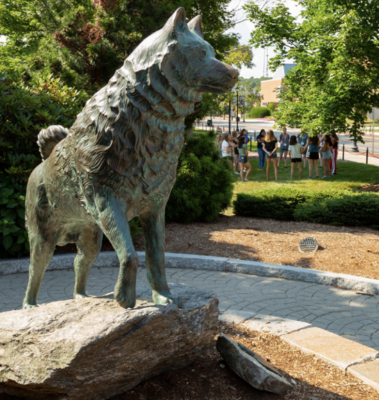 Generation College students. We are looking forward to another year with her on our team and all the
Generation College students. We are looking forward to another year with her on our team and all the
possibilities that brings. We are also excited to welcome our newest HESA GA, Deanna Gallegos, to the PCS
team this fall. Deanna is a 2019 graduate of the University of California-Davis and will be with us for the next
two years.
We don’t know where we’d be without our GAs. Erin, Joe, Cody, Nicole, and soon-to-be Deanna have all, and
will, shape PCS in unique ways that highlight their own interests and strengths. Thank you for all your hard
work and dedication to the program.
UConn ECE Recognizes Excellence and Awards Six Student Scholarships
By Carissa Rutkaukas
Each year UConn Early College Experience (ECE) gets to know some of its seniors through a glimpse of their work and provides a $500 scholarship in honor of their accolades. This year, three committees of four considered over 100 applications for only five awards. Those that did not meet the posted requirements were eliminated early, but that did not make the decisions any easier. Many of those that remained showed creativity, ingenuity, uniqueness, and a contribution to the greater good. The applicant pool was so strong this year, we ended up awarding a sixth award! UConn ECE is proud to recognize the following Students.
Excellence in the Arts, Humanities or Social Sciences demonstrate academic achievement and a potential for future academic and professional accomplishments in a field focusing on the Arts, Humanities, and/or Social Sciences Excellence in Science, Technology, Engineering, or Mathematics demonstrate academic achievement and a potential for future academic and professional accomplishments in the fields of Science, Technology, Engineering, and/or Mathematics Excellence in Civic and Community Engagement demonstrates ambition and self-drive evidenced by outstanding achievement in both school and their community…already making a positive difference in their town or neighborhood and inspiring others to do the same.
Name
Afroja Akter
Ellanora Lerner
Varsha Rathore
Cynthia Chen
Emil Perdue
Alexis Eaton
Award
Arts, Humanities, Social Sciences Scholarship
Arts, Humanities, Social Sciences Scholarship
STEM Scholarship
STEM Scholarship
Civic and Community Engagement Scholarship
Civic and Community Engagement Scholarship
School
Waterbury Career Academy High School
Fishers Island School
South Windsor High School
Greenwich High School
Greenwich High School
Lyman Hall High School
2020 UConn ECE Professional Recognition Awards Moves from Ceremony to Show
By Carissa Rutkauskas
UConn ECE faculty, staff, and award winners look forward to the annual Professional Recognition Awards Ceremony each year. They enjoy an elegant sit-down dinner, serenaded by a trio of UConn jazz ensemble students, celebrating a successful academic year by recognizing outstanding instruction and administration for the UConn Early College Experience Program. This year it would have been on Tuesday, April 28 in the Gallery of the Jorgenson Center for the Preforming Arts. Things did not quite go that way.
As high schools began closing in early March, first for 2 week, then for longer, the University told college students not to return to campus from Spring Break; faculty and staff began working remotely; and the opportunity to honor those nominated by their students and colleagues was not going to happen in person. So, we embraced technology and the good nature of the award recipients and went online. The prerecorded 2020 UConn ECE Professional Recognition Awards Show premiered on Monday, May 4 with a private screening on the UConn ECE YouTube channel. Friends, relatives, students, and colleagues were able to watch and interact with the 25-minute production. Eleven award recipients, 7 staff members, and 1 faculty member had submitted video footage that was then edited together by Austin Gao, Digital Media and design student, to create a memorable evening for all.
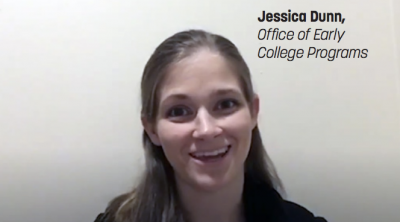
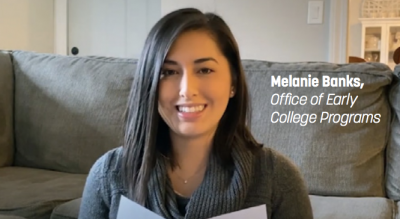
Congratulations to the 2020 winners:
| Award | Name | School | Discipline |
| Thomas E. Recchio Faculty Coordinator Award for Academic Leadership | Scott Campbell | UConn | English |
| Principal Award for Program Support & Advocacy | Thomas Moore | Wethersfield High School | Principal |
| Site Representative Award for Excellence in Program Administration | Alicia Melillo | Cromwell High School School | Counselor |
| Instructor Award for Excellence in Course Instruction | Eric Bosley | Plainville High School | European History |
| Angela Brower | RHAM High School | Latin | |
| Libbi Intemann | Trumbull High School | Philosophy | |
| Geoffrey Kern | Edwin O. Smith High School | Statistics | |
| James DeCesare | The Master’s School | Drawing | |
| Sarah Tibbetts | Daniel Hand High School | Chemistry | |
| “Rookie of the Year” Award for Excellence in First-Year Course Instruction | Carla Toney | Newington High School | Italian and French |
| Jan Pikul Award for Continued Excellence in Instruction | William Schultz | Enfield High School | Chemistry |
Overcoming Adversity: UConn ECE Strong
By UConn ECE Program Office Staff
A committee of four reviewed and selected the cover for the Spring 2020 edition of the UConn ECE Magazine from student submissions responding to a call to show adaption to distance learning that embodies “Overcoming Adversity – UConn ECE Strong.” The winning photo includes the caption “Distance makes the heart grow fonder” and captures one of the many signs that the community displays in their front yards thanking essentials workers.
The committee recognizes the essential work that teachers continue to do from a distance during such unprecedented times and have had to adjust their lesson plans and schedules to meet the needs of their students. We have also included two runner up photos, one depicting the abstract passing of time during such a surreal experience and the other capturing what school at home looks like for a student.
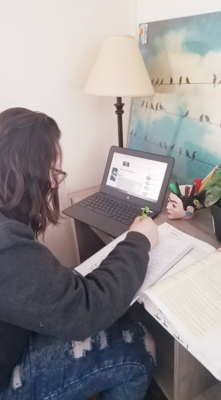
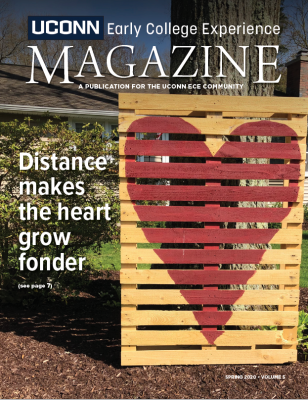

Erin Blanchette Transitions to Another Office
By Brian A. Boecherer
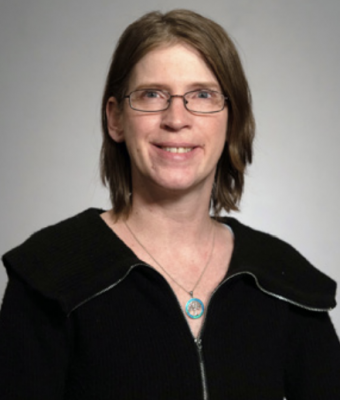
The office is experiencing another transition – Erin Blanchette – our long-time colleague has transitioned to another job at the University in the accounting division. We are sad to see Erin go, and her departure has left a noticeable hole in the office. We are, however, so happy for her, as this is clearly a good progression and a new exciting adventure for her. Erin joined the office in 2006 and has filled many positions over the years. Some may remember her as the registration coordinator and also assistant to the previous director. In more recent times Erin has led our financial area – modernizing student billing, collections, and developing a billing customer service presence for the office. Erin is also responsible for deepening our relationship with the Avery Point Campus and working with the leadership on that campus to host a UConn ECE Cardboard Boat Race in conjunction with Avery Point’s boat race. Erin created the UConn ECE store and has been a big part of our student outreach and UConn ECE marketing and branding. Not only has Erin accomplished much, she has created relationships that will last. Erin has been an important team builder in the office, instigating office lunches, holiday parties, birthday parties, and being one of the “special ingredients” that have made the office fun and familial. Erin leaves a lasting mark on the program and with whom she has worked. Thank you, Erin, for all that you have done to support the program and the people who make the program.
Registration 2020-2021
By Todd Blodgett
As colleges, universities, and K-12 education moved to distance learning due to school closures, UConn proved to be no different. With the conclusion of the 2019-2020 academic year, UConn Early College Experience (ECE) moves into the new registration year. Our program has made some adjustments to our application in order to better accommodate students who are applying while physically away from their high schools.
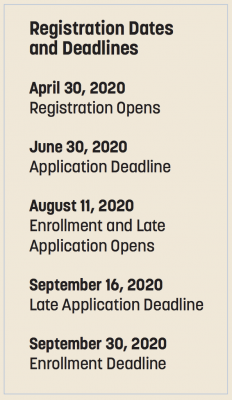
1. Students do not need to obtain a Site Representative or school counselor signature on their consent form. High schools will confirm student enrollment in the Fall.
2. There will be no additional $25 administrative fee for students who cannot apply before June 30th and need to apply in the Fall.
While the Spring 2020 semester was not what our students expected, we are excited to get everyone back in classrooms and engaging in our UConn ECE courses soon. Please continue to monitor your e-mail, our website (ece.uconn. edu), and our social media platforms for registration news. Students should continue to engage with their school counselors about taking UConn courses through Early College Experience.
Have a great Summer and we look forward to collaborating with you this Fall as we begin a new academic year!

